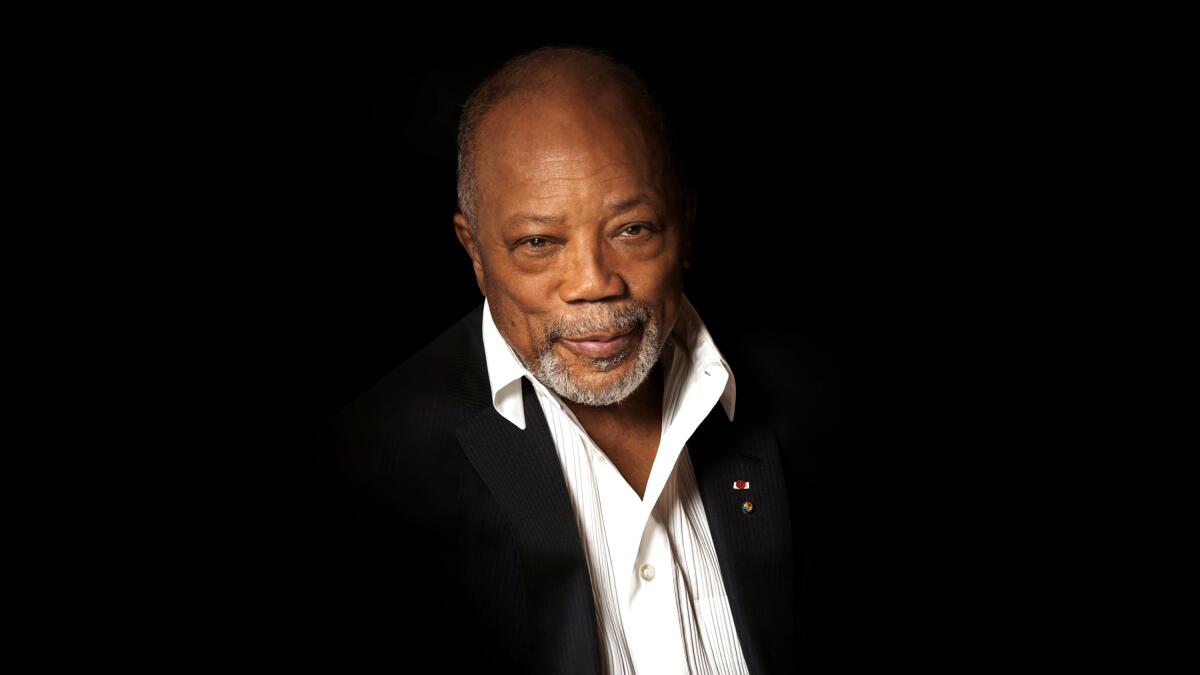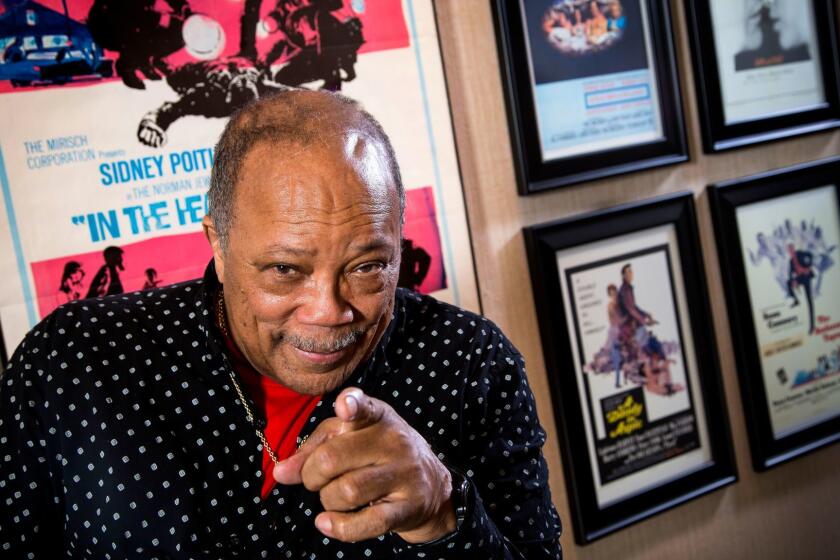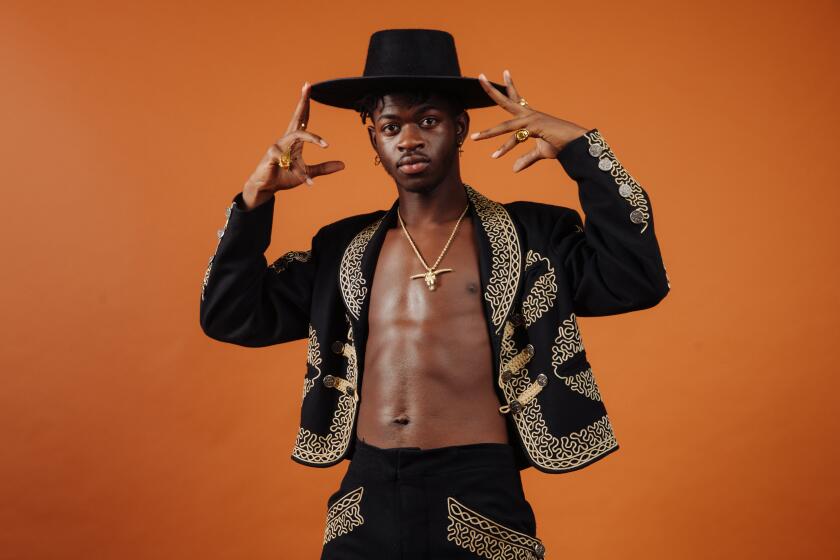Quincy Jones, in his own words for the L.A. Times: ‘If it can’t get funky, brother, you don’t touch it’

- Share via
The late Quincy Jones’ life spanned the entirety of modern American pop music — a tradition he absorbed, influenced and reinvented for generations. It’s remarkable to look back on the composer, arranger and producer’s life and hear him speak on his friendships and work with Sidney Poitier, Lena Horne, Ella Fitzgerald, Stevie Wonder, Michael Jackson and Tupac Shakur, among hundreds more.
Over the years, The Times spoke to Jones — who died Sunday at 91 — at many junctures in his career, where he recalled being a Black composer in Hollywood in a less-enlightened mid-century climate; making perhaps the biggest pop album of the century with Michael Jackson, and his heartbreak over gangsta rap’s real world violence that touched his family.
For his autobiography, Quincy Jones had to come to terms with a life both wildly successful and tumultuous. It wasn’t easy.
Jones’ philosophy on music was cosmopolitan and curious from the start. He traveled widely, and as a composer, he learned from European classical and folk traditions, pairing them with the innovations of Black art forms like American jazz.
Traditional music “enhances your soul,” he told The Times in 2001. “Because you see that most countries, the evolution of their music is based on the roots of their folk music, like ours is. [Béla] Bartók came out of Hungarian folk music. The Scandinavian folklore is awesome. All those tunes that Miles [Davis] and Stan Getz played, ‘Dear Old Stockholm,’ beautiful folk music, you can’t believe how beautiful it is. Traveling is the best education there is. You’re experiencing their food that they like to eat and their language and their music. And that’s the soul. That’s the real stuff. They would tell us: Don’t go to the souk [a marketplace or bazaar]! Don’t go to the casbah! That’s just where we went. That’s like going to the ‘hood! I’m right up in there in a minute, baby.”
Jazz, one of his first loves, imbued everything he did in film scores, pop and education. “[Count] Basie, Clark Terry, it was an amazing education,” he said. “I talk a lot now. But I used to sit down and shut up and listen to them. Because old people know what they are talking about, they’ve been there. All of the young brothers that call Louis Armstrong a ‘Tom’ and all that stuff. This is the man who invented our music. He had no samples, he has no radio station or nothing to listen to. He’s just inventing it. Art Blakey told Branford Marsalis, ‘We had to take a lot so you can do your little flip stuff.’ It’s true. There is a lot of blood out there.”
“Before I die, I want to be a part of a way for Americans to know their own music,” he added. “They don’t get it. We’ve got the greatest mother ship on the planet. We’ve got to talk to the administration. We need a minister of culture — I don’t want to do it, but we need one. Everyone’s got one. This country’s culture is the Esperanto of the world. It’s the first thing that they cut from schools, but if they had it, [there] would be a better spirit in the country.”
Quincy Jones looks back over his film music composer career before TCM Classic Film Festival events including a screening of ‘The Italian Job.’
Jones came to early renown as a film composer, where he wrote the scores to Oscar-winning “In the Heat of the Night,” “The Wiz,” “In Cold Blood” and “The Color Purple,” among many others. But breaking that ground was an often lonely endeavor for a Black artist in mid-century Hollywood.
“Sidney Poitier and I were the only ones out there,” said Jones, who scored several films starring Poitier, a close friend. “He handed me the baton for composers.”
As recording technology evolved away from simply documenting live performances to an artistic craft of its own, Jones adapted his methods for a new era. But he always tried to emphasize the human qualities of being in a room together with a band, reading each other.
“The essence of the music is designed to interact. Synthesizers and drum machines? That’s not interaction,” he said in 2001. “When I recorded with [Frank] Sinatra, Sinatra sitting right there in the booth, looking me, the rhythm section and the trumpet section straight in the eye. That was the only way we knew. And I can handle it any different way. Because I’ve worked with all the generations. It keeps moving. A lot of the guys didn’t want to change. … Now it’s modular and layers and overdubs and all of that.”
Yet Jones was quick to see the potential in new electronic instruments, and used a then-nascent Moog synthesizer to write his theme for 1967’s “Ironside.”
Quincy Jones turned 84 in March, but said he feels like he’s 18. “I stopped drinking two years ago.
“Robert Moog said to me, ‘Quincy, why don’t the brothers use my instrument?’ ” he recalled in 2017. “I said, ’Cause, man, No. 1: we sculpt an electronic signal into a sine wave that’s smooth, or a sawtooth, which is rough. The problem with it, though, is it doesn’t bend. And if it doesn’t bend, it can’t get funky. And if it can’t get funky, brother, you don’t touch it.’ So he came up with a pitch-bender and a portamento on it ... and I got it, real quick.”
Quincy Jones on Michael Jackson: ‘We made history together’
In the world of pop music, Jones’ work with Jackson, especially on the era-dominating LP “Thriller,” changed everything . “It was the perfect convergence of forces,” he said, in 2009’s moving reminiscence after Jackson’s death. ”In the music business, every decade you have a phenomenon. In the ‘40s you had Sinatra, in the ‘50s Elvis [Presley], in the ‘60s the Beatles. …In the ‘80s you had Michael Jackson.”
Jones discussed how he refined the gifts that made Jackson such a potent performer. “We owned the ‘80s and our souls would be connected forever,” he said. “Evoking Fred Astaire, Sammy Davis Jr. and James Brown all at once, he’d work for hours, perfecting every kick, gesture and movement so that they came together precisely the way they were intended to. We tried all kinds of tricks that I’d learned over the years to help him with his artistic growth, like dropping keys just a minor third to give him flexibility and a more mature range in the upper and lower registers, and more than a few tempo changes. I also tried to steer him to songs with more depth, some of them about real relationships…
“At one point during the session, the right speaker burst into flames. How’s that for a sign?” He asked. “It’s no accident that almost three decades later, no matter where I go in the world, in every club and karaoke bar, like clockwork, you hear ‘Billie Jean,’ ‘Beat It,’ ‘Wanna Be Starting Something,’ ‘Rock With You’ and ‘Thriller.’ ”
After Jackson’s ‘80s peak, as hip-hop became the dominant commercial force in pop music, he spoke with sadness and insight about how music designed to reflect real-world pain and neglect could also succumb to it. Jones, the founder and chairman of Vibe magazine whose daughter Kidada was engaged to Shakur at the time of his death, and Jones said for “the rest of my life” he’d pursuing peace within Black music.
‘We Need a Coalition of the Hip-Hop Nation’
“We need a coalition of the hip-hop nation,” he said. “I guess hip-hop has been closer to the pulse of the streets than any music we’ve had in a long time. It’s sociology as well as music, which is in keeping with the tradition of black music in America. If you read the musicology books, you don’t always get the full story.”
If major labels “participate in the profits of the music” suffering under violence, he added, “They have a responsibility for it. You’ve got to keep going, man. What else do you do? Go under? I wouldn’t be devoting my time to this if I didn’t think positively. The community has got to get it together. We want to help these young people survive and live out their talents and dreams.”
Looking back on his career, Jones bristled at the idea that his later achievements were due to his stature and connections rather than consistently inventive musicianship.
“What bothers me, people young and old try to minimize you by saying, ‘Well, Quincy’s strongest suit is that he’s got a strong telephone book ... and he can just call up anybody!’ ” he said in 2001. “Now that’s the funniest thing. I spent most of my life perfecting my skills. I wanted to be a great arranger, great orchestrator and great composer. That was it from 13. I did my thing. And then I was able to apply all of the elements. They see you sitting at a console holding your head like this, thinking, people don’t know what you’re doing. I’ve done 40,000 arrangements, 40 movies, I’ve worked with every singer on the planet, Black or white, Nana Mouskouri, Charles Aznavour, Stevie [Wonder]. That’s a lot of work. Like you don’t have to do anything. You just have a telephone book and call a bunch of great guys up. Please, man! That will get you two inches.”
Jones was never short on words when it came to setting the record straight about critics who tried to paint him as a sellout. By staying true to the craft of music in whatever shape or form he could, Jones may not have sold out, but his work made an indisputable mark and sold immensely.
“I started as an arranger first. That’s how I became a producer,” he said in 2001. “It’s a path you go through as an arranger that opens up a lot of doors of understanding. You work with all kinds of different people from Dinah Washington and Billy Eckstine, Tony Bennett, Paul Simon, Sinatra, Aretha [Franklin], Sarah [Vaughan], Ella [Fitzgerald], Carmen McRae. You learn so much by that school. That school doesn’t exist now, so it’s hard for them to understand what that gives you. Seven hundred miles a night for years. Traveling on that band bus. Seventy gigs in just the Carolinas. Twenty-seven in California. Everywhere. It’s ridiculous. And get stranded with a big band in Europe, and some sucker is gonna come talk to me about sellin’ out. Please. Give me a break. Yo mama!”
More to Read
The biggest entertainment stories
Get our big stories about Hollywood, film, television, music, arts, culture and more right in your inbox as soon as they publish.
You may occasionally receive promotional content from the Los Angeles Times.













